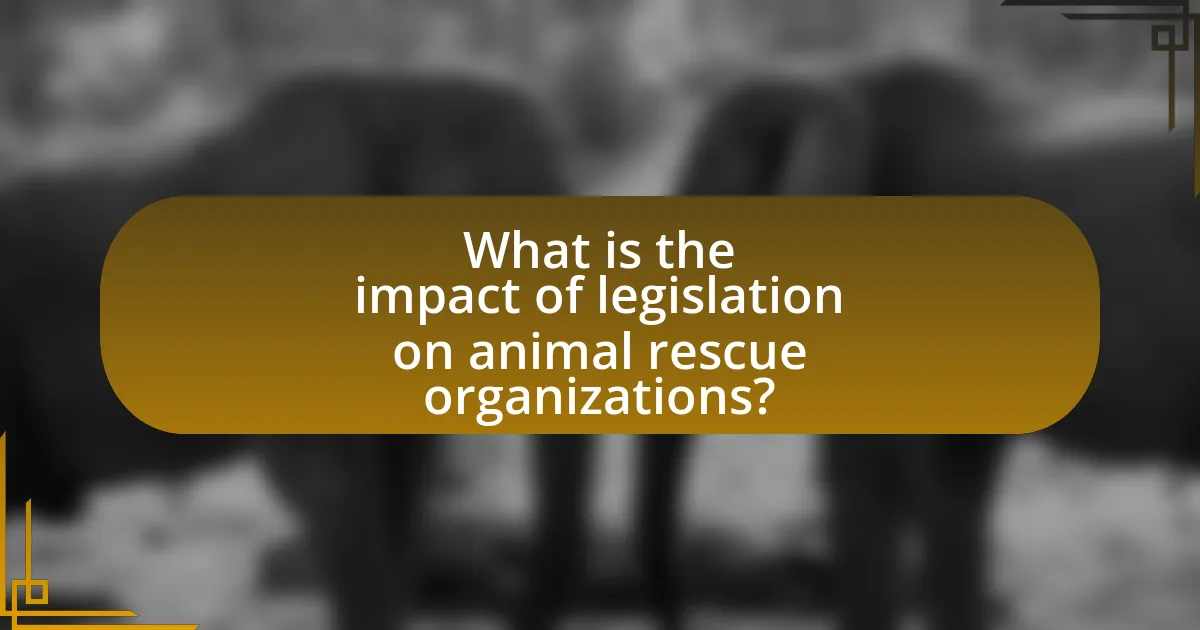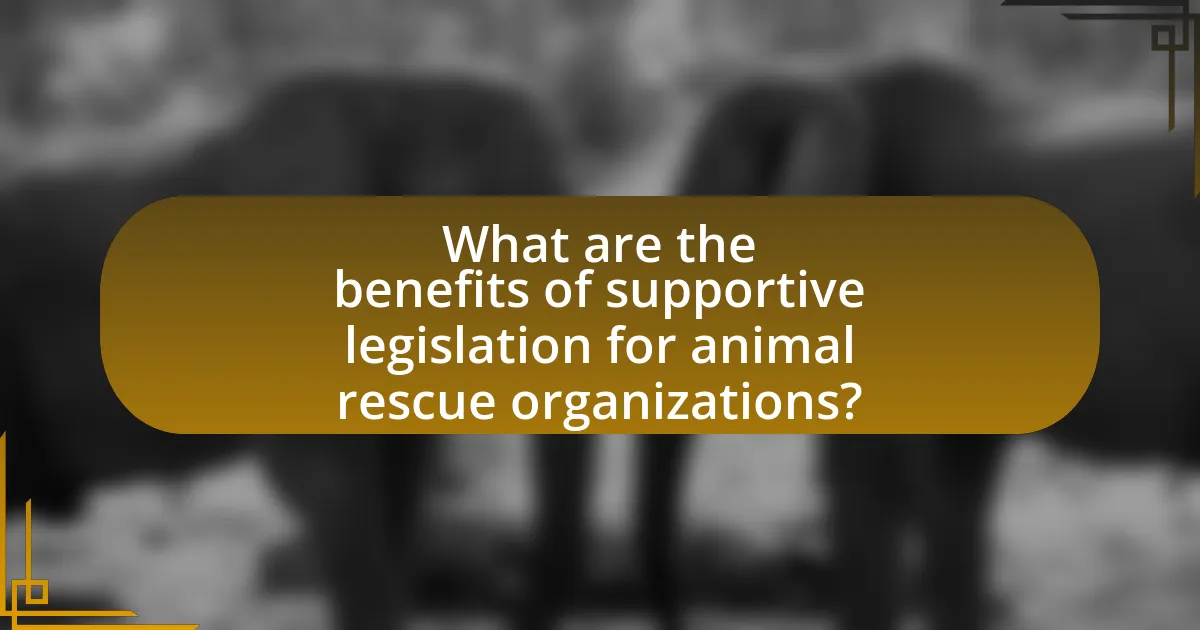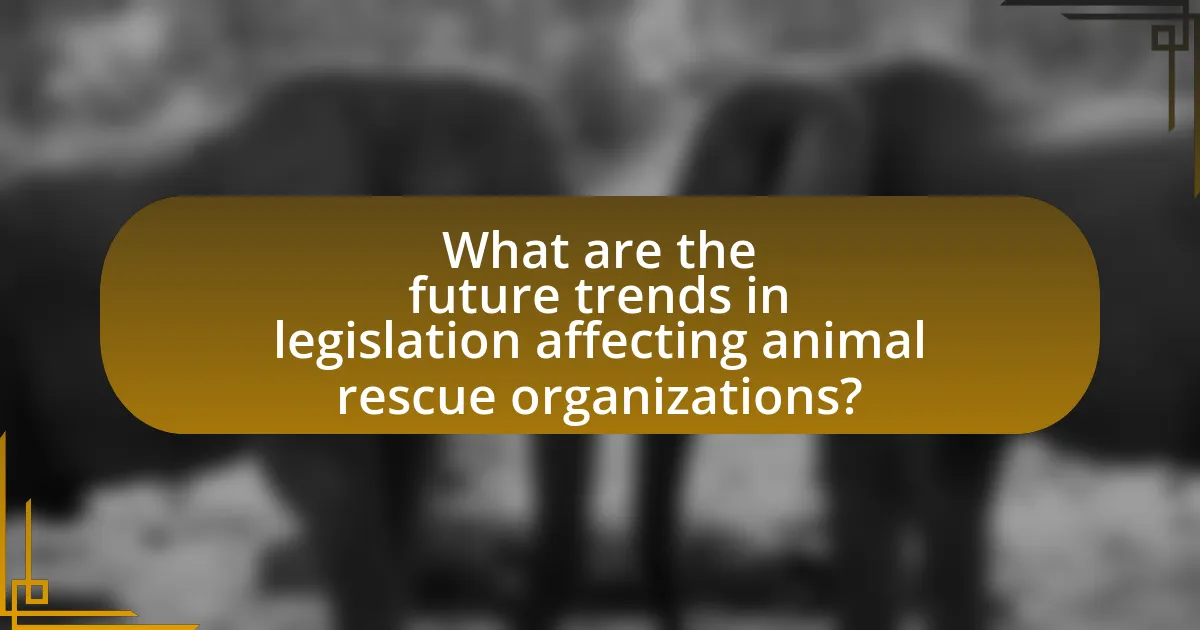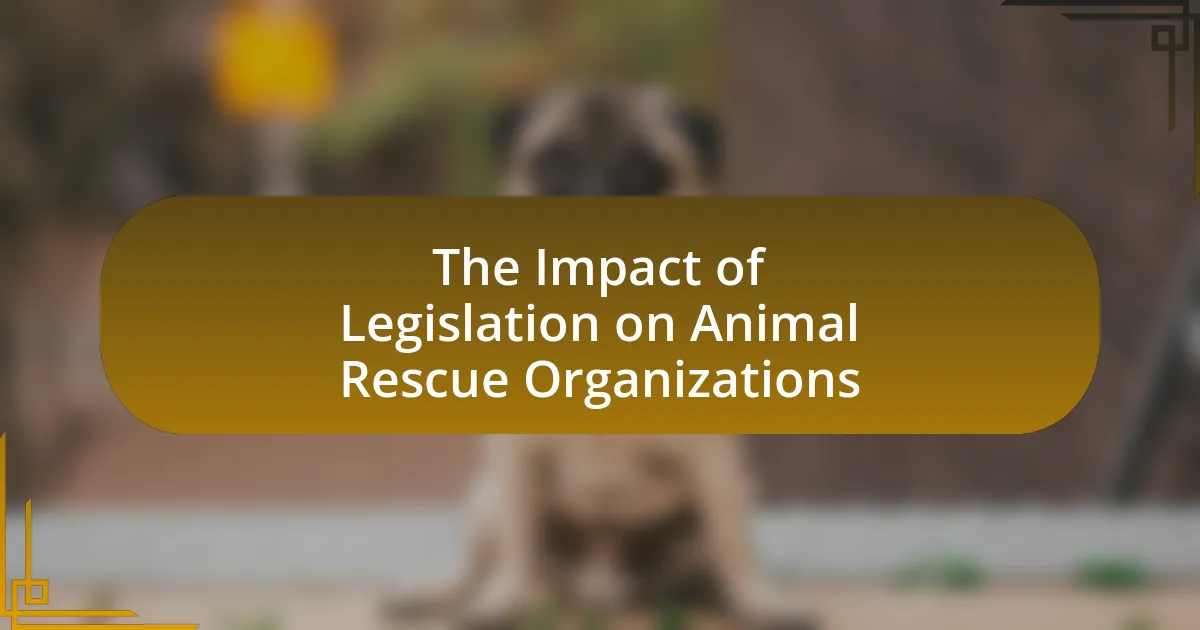The article examines the impact of legislation on animal rescue organizations, highlighting how legal frameworks shape their operations, funding, and animal welfare standards. It discusses specific laws, such as the Animal Welfare Act, that establish care requirements and compliance obligations for these organizations. The article also addresses the challenges posed by restrictive regulations, the importance of supportive legislation for enhancing rescue efforts, and the role of advocacy in influencing future laws. Additionally, it explores how public perception and community support are affected by legislative measures, ultimately emphasizing the critical relationship between legislation and animal welfare.

What is the impact of legislation on animal rescue organizations?
Legislation significantly impacts animal rescue organizations by establishing legal frameworks that govern their operations, funding, and animal welfare standards. For instance, laws such as the Animal Welfare Act in the United States set minimum care standards for animals, which rescue organizations must adhere to in order to maintain their licenses and receive funding. Additionally, legislation can provide financial support through grants and tax incentives, enhancing the capacity of these organizations to rescue and rehabilitate animals. Furthermore, stricter laws against animal cruelty can lead to increased demand for rescue services, as communities become more aware of animal rights issues.
How does legislation influence the operations of animal rescue organizations?
Legislation significantly influences the operations of animal rescue organizations by establishing legal frameworks that dictate their practices and responsibilities. For instance, laws regarding animal welfare set standards for the treatment and care of animals, which organizations must adhere to in order to operate legally. Additionally, regulations concerning licensing and permits can affect how these organizations manage their facilities and conduct rescues. Compliance with local, state, and federal laws is essential for securing funding and support, as many grants and donations require adherence to specific legal standards. Furthermore, legislation can impact the scope of rescue efforts, such as restrictions on the types of animals that can be rescued or the conditions under which they can be housed. Overall, the legal environment shapes the operational capabilities and ethical responsibilities of animal rescue organizations.
What specific laws affect animal rescue organizations?
Animal rescue organizations are primarily affected by laws related to animal welfare, licensing, and nonprofit regulations. The Animal Welfare Act (AWA) sets minimum standards for the care and treatment of animals in various settings, including shelters and rescues. Additionally, state-specific laws may require animal rescue organizations to obtain licenses or permits to operate legally, ensuring compliance with local regulations. Nonprofit status laws also impact these organizations, as they must adhere to regulations governing tax-exempt status and fundraising activities. These laws collectively ensure that animal rescue organizations operate ethically and responsibly, safeguarding the welfare of the animals they serve.
How do these laws change the way organizations operate?
Laws change the way organizations operate by imposing new regulations that dictate their practices and procedures. For example, animal welfare laws require rescue organizations to adhere to specific standards of care, which can lead to increased operational costs and the need for staff training. Compliance with these laws often necessitates the implementation of detailed record-keeping systems to track animal health and welfare, thereby altering administrative processes. Additionally, organizations may need to engage in advocacy and public education efforts to ensure community awareness and support for their mission, reflecting a shift in focus from solely rescue operations to broader community engagement.
Why is legislation important for animal welfare?
Legislation is crucial for animal welfare because it establishes legal standards that protect animals from abuse and neglect. These laws create a framework for the humane treatment of animals, ensuring that they receive proper care and protection from harmful practices. For instance, the Animal Welfare Act in the United States sets minimum standards for the treatment of animals in research, exhibition, and transport, thereby reducing instances of cruelty and promoting ethical treatment. Additionally, legislation can facilitate the enforcement of penalties against violators, which serves as a deterrent to potential abusers. This legal structure not only safeguards animals but also promotes public awareness and responsibility regarding animal welfare issues.
What role does legislation play in protecting animals?
Legislation plays a crucial role in protecting animals by establishing legal standards and regulations that prevent cruelty and exploitation. These laws, such as the Animal Welfare Act in the United States, set minimum care requirements for animals and impose penalties for violations, thereby promoting humane treatment. Additionally, legislation can facilitate the work of animal rescue organizations by providing them with legal frameworks to operate, ensuring that rescued animals receive necessary care and protection under the law. For instance, laws that regulate breeding practices help reduce overpopulation and abandonment, directly benefiting animal welfare.
How does legislation impact public perception of animal rescue?
Legislation significantly shapes public perception of animal rescue by establishing legal standards that promote animal welfare and responsible pet ownership. For instance, laws mandating spaying and neutering can reduce the number of stray animals, leading to a more positive view of rescue organizations as effective in addressing overpopulation. Additionally, legislation that imposes penalties for animal cruelty enhances public trust in these organizations, as it demonstrates a commitment to protecting animals. Research indicates that communities with strong animal protection laws often see increased support for local rescue efforts, as citizens feel empowered to report neglect and abuse, thereby fostering a culture of accountability and compassion towards animals.
What challenges do animal rescue organizations face due to legislation?
Animal rescue organizations face significant challenges due to legislation, primarily in the form of restrictive laws that limit their ability to operate effectively. For instance, some jurisdictions impose stringent regulations on the types of animals that can be rescued or require extensive licensing that can be costly and time-consuming to obtain. Additionally, laws regarding the transport of animals can hinder rescues from relocating animals to safer environments, as seen in states with strict animal transport regulations. These legislative barriers can lead to increased operational costs and reduced capacity to save animals in need, ultimately impacting the overall effectiveness of rescue efforts.
What are the common legal hurdles for these organizations?
Animal rescue organizations commonly face legal hurdles such as compliance with local and state regulations, liability issues, and zoning laws. Compliance with regulations often involves adhering to animal welfare standards, which can vary significantly by jurisdiction, leading to challenges in operational consistency. Liability issues arise when organizations are held responsible for injuries or damages caused by animals in their care, necessitating comprehensive insurance coverage. Additionally, zoning laws can restrict the ability to operate shelters or rescue facilities in certain areas, complicating the establishment of necessary infrastructure. These legal challenges can hinder the effectiveness and sustainability of animal rescue efforts.
How do funding and resources get affected by legal requirements?
Legal requirements significantly affect funding and resources for animal rescue organizations by imposing compliance costs and eligibility criteria for financial support. These organizations often need to allocate funds for legal compliance, such as obtaining permits, adhering to animal welfare standards, and meeting reporting obligations, which can divert resources from direct rescue efforts. For instance, the Animal Welfare Act mandates specific care standards, requiring organizations to invest in facilities and training, thereby increasing operational costs. Additionally, legal requirements can limit access to grants or donations if organizations fail to meet stipulated criteria, further constraining their financial resources.
How can animal rescue organizations adapt to changing legislation?
Animal rescue organizations can adapt to changing legislation by actively monitoring legal developments and adjusting their policies and practices accordingly. This involves establishing a dedicated team to track legislative changes at local, state, and federal levels, ensuring compliance with new laws. For instance, organizations can implement training programs for staff and volunteers to familiarize them with updated regulations, such as those related to animal welfare standards or adoption processes. Additionally, engaging in advocacy efforts can help shape future legislation, allowing organizations to voice their concerns and influence policy decisions. By staying informed and proactive, animal rescue organizations can effectively navigate the complexities of evolving legal landscapes.
What strategies can organizations implement to comply with new laws?
Organizations can implement several strategies to comply with new laws, including conducting regular compliance audits, providing employee training, and establishing clear policies and procedures. Regular compliance audits help identify gaps in adherence to new regulations, allowing organizations to address issues proactively. Employee training ensures that staff members are aware of legal requirements and understand their roles in compliance. Establishing clear policies and procedures provides a framework for consistent practices that align with legal standards. These strategies are supported by the fact that organizations that prioritize compliance training and audits are less likely to face legal penalties, as evidenced by studies showing a reduction in violations among compliant organizations.
How can advocacy play a role in shaping favorable legislation?
Advocacy plays a crucial role in shaping favorable legislation by mobilizing public support and influencing policymakers to enact laws that benefit specific causes, such as animal welfare. Through organized campaigns, advocacy groups raise awareness about issues affecting animal rescue organizations, presenting compelling data and personal stories that highlight the need for legislative change. For instance, the Humane Society of the United States successfully advocated for the passage of the Animal Welfare Act amendments, which improved standards for the treatment of animals in shelters. This demonstrates how targeted advocacy efforts can lead to significant legislative outcomes that enhance protections for animals and support rescue organizations.

What are the benefits of supportive legislation for animal rescue organizations?
Supportive legislation for animal rescue organizations enhances their operational effectiveness and sustainability. Such legislation can provide financial support through grants and tax incentives, which are crucial for funding rescue operations and veterinary care. Additionally, supportive laws can establish clearer regulations for animal welfare, ensuring that rescue organizations can effectively advocate for and protect animals from abuse and neglect. For instance, the Animal Welfare Act in the United States sets standards for the treatment of animals, which directly benefits rescue organizations by promoting humane practices. Furthermore, supportive legislation can facilitate partnerships between government agencies and rescue organizations, leading to improved resource sharing and community outreach efforts.
How does favorable legislation enhance the effectiveness of animal rescue efforts?
Favorable legislation enhances the effectiveness of animal rescue efforts by providing legal protections and resources that facilitate the rescue and rehabilitation of animals. For instance, laws that mandate spaying and neutering can reduce the number of stray animals, thereby decreasing the burden on rescue organizations. Additionally, legislation that allocates funding for animal shelters and rescue operations enables these organizations to improve their facilities and services, ultimately leading to higher adoption rates. Furthermore, laws that impose penalties for animal cruelty deter potential offenders, creating a safer environment for animals in need. These legislative measures collectively strengthen the operational capacity of animal rescue organizations, allowing them to respond more effectively to animal welfare issues.
What specific outcomes can be achieved with supportive laws?
Supportive laws can lead to improved animal welfare, increased funding for rescue organizations, and enhanced public awareness. Specifically, legislation that mandates humane treatment of animals can reduce cases of abuse and neglect, as seen in states with strict anti-cruelty laws, which report lower rates of animal cruelty incidents. Additionally, laws that provide tax incentives or grants for animal rescue organizations can significantly boost their operational capabilities, allowing them to rescue and rehabilitate more animals. For example, the Animal Welfare Act in the United States has facilitated funding for various animal protection initiatives, demonstrating a direct correlation between supportive legislation and positive outcomes for animal welfare.
How does legislation facilitate collaboration among organizations?
Legislation facilitates collaboration among organizations by establishing legal frameworks that promote partnerships and resource sharing. For instance, laws that provide tax incentives for collaborative efforts encourage organizations to work together on common goals, such as animal welfare. Additionally, legislation can create formal channels for communication and cooperation, such as inter-agency agreements, which streamline processes and enhance efficiency in joint initiatives. These frameworks not only foster trust among organizations but also ensure compliance with regulations, thereby enhancing the overall effectiveness of collaborative efforts in areas like animal rescue.
What types of legislation are most beneficial for animal rescue organizations?
Animal rescue organizations benefit most from legislation that enhances animal welfare, regulates breeding practices, and provides funding for rescue operations. Animal welfare laws, such as the Animal Welfare Act in the United States, set standards for the treatment of animals, ensuring they are not subjected to cruelty or neglect. Regulations on breeding, like mandatory spay/neuter laws, help control the pet population, reducing the number of animals in need of rescue. Additionally, government grants and funding initiatives specifically aimed at animal rescue organizations enable them to operate effectively and expand their services, as evidenced by programs that allocate millions in funding to support shelters and rescue efforts.
What are the key features of effective animal welfare laws?
Effective animal welfare laws include clear definitions of animal rights, enforcement mechanisms, and provisions for humane treatment. These laws establish standards for care, prohibit cruelty, and mandate reporting of abuse, ensuring accountability. For instance, the Animal Welfare Act in the United States sets minimum standards for the treatment of animals in research, exhibition, and transport, demonstrating a legislative framework that prioritizes animal welfare. Additionally, effective laws often involve collaboration with animal rescue organizations, enhancing their ability to respond to cases of neglect and abuse.
How do these laws promote responsible pet ownership?
Laws promote responsible pet ownership by establishing clear guidelines and requirements for pet care, which help ensure the welfare of animals. These regulations often mandate vaccinations, spaying or neutering, and proper identification, which contribute to public health and reduce the number of stray animals. For instance, studies have shown that communities with mandatory spay/neuter laws experience a significant decrease in shelter intake rates, demonstrating the effectiveness of such legislation in promoting responsible ownership.
How can communities support animal rescue organizations through legislation?
Communities can support animal rescue organizations through legislation by advocating for laws that provide funding, resources, and protections for these organizations. For instance, legislation can establish grants specifically for animal shelters and rescue groups, ensuring they have the financial means to operate effectively. Additionally, communities can push for laws that mandate spaying and neutering, which can reduce the number of abandoned animals and subsequently lessen the burden on rescue organizations. Evidence shows that communities with such laws experience a decrease in stray populations, which directly benefits animal rescue efforts. Furthermore, legislation can enhance animal welfare standards, ensuring that rescue organizations operate under humane conditions, thereby improving the overall effectiveness of their missions.
What role do local governments play in animal welfare legislation?
Local governments play a crucial role in animal welfare legislation by enacting and enforcing laws that protect animals within their jurisdictions. These local authorities establish ordinances related to animal control, cruelty prevention, and responsible pet ownership, which directly impact the welfare of animals. For instance, many municipalities have specific regulations regarding licensing, spaying and neutering, and the treatment of stray animals, which are designed to promote humane treatment and reduce overpopulation. Additionally, local governments often collaborate with animal rescue organizations to implement community programs and initiatives aimed at improving animal welfare, thereby enhancing the effectiveness of legislation at the grassroots level.
How can citizens advocate for better laws for animal rescue?
Citizens can advocate for better laws for animal rescue by engaging in grassroots campaigns, contacting legislators, and participating in public forums. Grassroots campaigns can mobilize community support and raise awareness about animal welfare issues, while direct communication with legislators can influence policy decisions. Public forums allow citizens to voice their concerns and propose changes to existing laws. According to a 2021 survey by the American Society for the Prevention of Cruelty to Animals (ASPCA), 70% of respondents indicated that they would support legislation aimed at improving animal welfare, demonstrating public interest in advocacy efforts.

What are the future trends in legislation affecting animal rescue organizations?
Future trends in legislation affecting animal rescue organizations include increased regulation on breeding practices, enhanced animal welfare standards, and greater accountability for pet ownership. Legislative bodies are increasingly focusing on laws that limit puppy mills and promote adoption over breeding, as evidenced by recent bills passed in various states that impose stricter licensing requirements for breeders. Additionally, there is a growing trend towards implementing comprehensive animal welfare laws that mandate humane treatment and care for animals, reflecting public demand for higher standards. Furthermore, legislation is evolving to hold pet owners accountable for the well-being of their animals, with penalties for neglect and abandonment becoming more common. These trends indicate a shift towards more protective measures for animals, driven by societal attitudes favoring animal rights and welfare.
How is public opinion shaping future animal welfare laws?
Public opinion is significantly shaping future animal welfare laws by influencing policymakers to prioritize animal rights and welfare in legislative agendas. Surveys indicate that a majority of the public supports stronger animal protection laws, with 70% of Americans favoring stricter regulations on animal cruelty, according to a 2021 Gallup poll. This growing concern for animal welfare has led to increased advocacy efforts, prompting lawmakers to respond with legislation aimed at enhancing protections for animals, such as bans on puppy mills and improved standards for farm animal treatment. Consequently, public sentiment is driving a legislative shift towards more humane treatment of animals, reflecting societal values and ethical considerations regarding animal rights.
What emerging issues are likely to influence legislation?
Emerging issues likely to influence legislation include animal welfare concerns, climate change impacts, and public health crises. Animal welfare concerns are increasingly prompting lawmakers to consider stricter regulations on breeding practices and animal treatment, as evidenced by the rise in public support for animal rights initiatives. Climate change impacts are leading to legislative discussions around habitat preservation and the protection of endangered species, with studies indicating that biodiversity loss can have significant ecological consequences. Public health crises, such as zoonotic diseases, are also driving legislative action to improve animal control measures and enhance biosecurity protocols, as highlighted by the World Health Organization’s reports linking animal health to human health outcomes.
How can organizations prepare for upcoming legislative changes?
Organizations can prepare for upcoming legislative changes by conducting thorough research on proposed laws and regulations relevant to their operations. This involves monitoring legislative updates, engaging with legal experts, and participating in industry associations that provide insights into potential changes. For instance, the American Society for the Prevention of Cruelty to Animals (ASPCA) regularly updates its members on legislative developments affecting animal welfare, which helps organizations stay informed and proactive. By establishing a compliance framework and training staff on new regulations, organizations can ensure they adapt effectively to changes, minimizing legal risks and enhancing their operational readiness.
What best practices can animal rescue organizations adopt in response to legislation?
Animal rescue organizations can adopt best practices such as staying informed about relevant legislation, implementing compliance protocols, and engaging in advocacy efforts. Staying informed allows organizations to understand new laws affecting animal welfare, such as the Animal Welfare Act, which sets standards for the treatment of animals in shelters. Implementing compliance protocols ensures that organizations meet legal requirements, such as proper licensing and reporting, which can prevent legal issues and enhance credibility. Engaging in advocacy efforts helps organizations influence future legislation by collaborating with lawmakers and participating in public awareness campaigns, thereby promoting animal welfare on a broader scale.
How can organizations ensure compliance with existing laws?
Organizations can ensure compliance with existing laws by implementing comprehensive compliance programs that include regular training, audits, and legal consultations. These programs help organizations stay informed about relevant legislation, such as animal welfare laws, and ensure that all employees understand their responsibilities. For instance, the American Society for the Prevention of Cruelty to Animals (ASPCA) emphasizes the importance of ongoing education and adherence to state and federal regulations to avoid legal penalties and promote ethical practices in animal rescue.
What resources are available for staying informed about legislative changes?
To stay informed about legislative changes, individuals can utilize government websites, legal databases, and advocacy organization newsletters. Government websites, such as Congress.gov and state legislative websites, provide official updates on bills and legislative actions. Legal databases like Westlaw and LexisNexis offer comprehensive access to legal documents and legislative histories. Additionally, newsletters from advocacy organizations, such as the Humane Society or ASPCA, often summarize relevant legislative changes impacting animal welfare. These resources ensure timely and accurate information regarding legislative developments.
